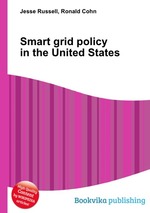Smart grid policy in the United States
Jesse Russell Ronald Cohn
бумажная книга
High Quality Content by WIKIPEDIA articles! The term smart grid "has come to describe a next-generation electrical power system that is typified by the increased use of communications and information technology in the generation, delivery and consumption of electrical energy." Some of the main benefits to smart grid technology are that individual consumers have more control over their electricity consumption, which can lead to greater overall energy efficiency. Home appliances can be programmed to run at specific times when electrical demand is lowest. This has a two-pronged benefit of reducing the occurrence of brownouts and blackouts that frequent our current electrical grid, as well as reducing the need for peak power plants, which are typically more expensive to run. The reliability and efficiency of our electrical grid can be enhanced by implementing smart grid technologies, however this would require modifications to our current electrical system, and advances towards its adoption in the United States have been slow. The history of smart grid related policies and their implications on the American electrical system, as well as Title XIII of the Energy Independence and Security Act of 2007 and potential future regulations and policy pertaining to smart grid will be discussed to give some indication as to the status of Smart Grid policy and potential adoption in the United States.


